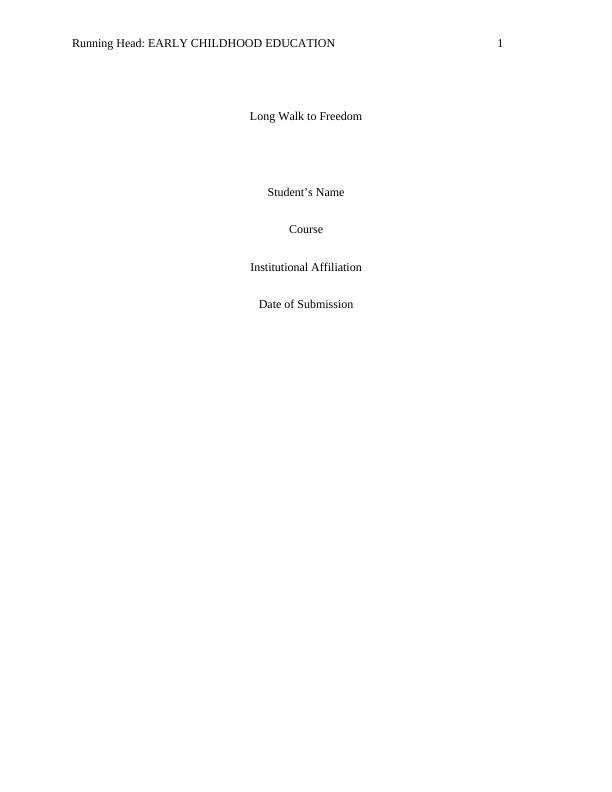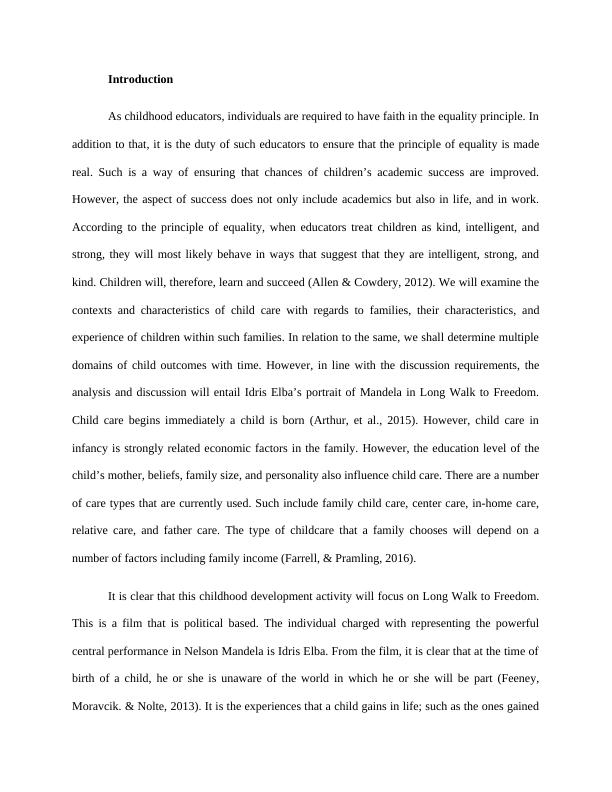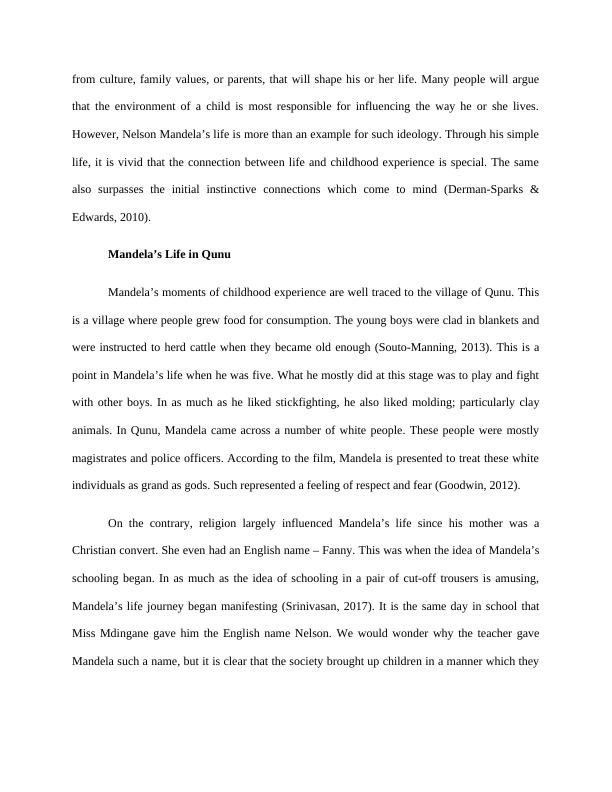Long Walk to Freedom: Childhood Development and Care in South Africa
Added on 2023-06-15
10 Pages3353 Words447 Views
Running Head: EARLY CHILDHOOD EDUCATION 1
Long Walk to Freedom
Student’s Name
Course
Institutional Affiliation
Date of Submission
Long Walk to Freedom
Student’s Name
Course
Institutional Affiliation
Date of Submission

Introduction
As childhood educators, individuals are required to have faith in the equality principle. In
addition to that, it is the duty of such educators to ensure that the principle of equality is made
real. Such is a way of ensuring that chances of children’s academic success are improved.
However, the aspect of success does not only include academics but also in life, and in work.
According to the principle of equality, when educators treat children as kind, intelligent, and
strong, they will most likely behave in ways that suggest that they are intelligent, strong, and
kind. Children will, therefore, learn and succeed (Allen & Cowdery, 2012). We will examine the
contexts and characteristics of child care with regards to families, their characteristics, and
experience of children within such families. In relation to the same, we shall determine multiple
domains of child outcomes with time. However, in line with the discussion requirements, the
analysis and discussion will entail Idris Elba’s portrait of Mandela in Long Walk to Freedom.
Child care begins immediately a child is born (Arthur, et al., 2015). However, child care in
infancy is strongly related economic factors in the family. However, the education level of the
child’s mother, beliefs, family size, and personality also influence child care. There are a number
of care types that are currently used. Such include family child care, center care, in-home care,
relative care, and father care. The type of childcare that a family chooses will depend on a
number of factors including family income (Farrell, & Pramling, 2016).
It is clear that this childhood development activity will focus on Long Walk to Freedom.
This is a film that is political based. The individual charged with representing the powerful
central performance in Nelson Mandela is Idris Elba. From the film, it is clear that at the time of
birth of a child, he or she is unaware of the world in which he or she will be part (Feeney,
Moravcik. & Nolte, 2013). It is the experiences that a child gains in life; such as the ones gained
As childhood educators, individuals are required to have faith in the equality principle. In
addition to that, it is the duty of such educators to ensure that the principle of equality is made
real. Such is a way of ensuring that chances of children’s academic success are improved.
However, the aspect of success does not only include academics but also in life, and in work.
According to the principle of equality, when educators treat children as kind, intelligent, and
strong, they will most likely behave in ways that suggest that they are intelligent, strong, and
kind. Children will, therefore, learn and succeed (Allen & Cowdery, 2012). We will examine the
contexts and characteristics of child care with regards to families, their characteristics, and
experience of children within such families. In relation to the same, we shall determine multiple
domains of child outcomes with time. However, in line with the discussion requirements, the
analysis and discussion will entail Idris Elba’s portrait of Mandela in Long Walk to Freedom.
Child care begins immediately a child is born (Arthur, et al., 2015). However, child care in
infancy is strongly related economic factors in the family. However, the education level of the
child’s mother, beliefs, family size, and personality also influence child care. There are a number
of care types that are currently used. Such include family child care, center care, in-home care,
relative care, and father care. The type of childcare that a family chooses will depend on a
number of factors including family income (Farrell, & Pramling, 2016).
It is clear that this childhood development activity will focus on Long Walk to Freedom.
This is a film that is political based. The individual charged with representing the powerful
central performance in Nelson Mandela is Idris Elba. From the film, it is clear that at the time of
birth of a child, he or she is unaware of the world in which he or she will be part (Feeney,
Moravcik. & Nolte, 2013). It is the experiences that a child gains in life; such as the ones gained

from culture, family values, or parents, that will shape his or her life. Many people will argue
that the environment of a child is most responsible for influencing the way he or she lives.
However, Nelson Mandela’s life is more than an example for such ideology. Through his simple
life, it is vivid that the connection between life and childhood experience is special. The same
also surpasses the initial instinctive connections which come to mind (Derman-Sparks &
Edwards, 2010).
Mandela’s Life in Qunu
Mandela’s moments of childhood experience are well traced to the village of Qunu. This
is a village where people grew food for consumption. The young boys were clad in blankets and
were instructed to herd cattle when they became old enough (Souto-Manning, 2013). This is a
point in Mandela’s life when he was five. What he mostly did at this stage was to play and fight
with other boys. In as much as he liked stickfighting, he also liked molding; particularly clay
animals. In Qunu, Mandela came across a number of white people. These people were mostly
magistrates and police officers. According to the film, Mandela is presented to treat these white
individuals as grand as gods. Such represented a feeling of respect and fear (Goodwin, 2012).
On the contrary, religion largely influenced Mandela’s life since his mother was a
Christian convert. She even had an English name – Fanny. This was when the idea of Mandela’s
schooling began. In as much as the idea of schooling in a pair of cut-off trousers is amusing,
Mandela’s life journey began manifesting (Srinivasan, 2017). It is the same day in school that
Miss Mdingane gave him the English name Nelson. We would wonder why the teacher gave
Mandela such a name, but it is clear that the society brought up children in a manner which they
that the environment of a child is most responsible for influencing the way he or she lives.
However, Nelson Mandela’s life is more than an example for such ideology. Through his simple
life, it is vivid that the connection between life and childhood experience is special. The same
also surpasses the initial instinctive connections which come to mind (Derman-Sparks &
Edwards, 2010).
Mandela’s Life in Qunu
Mandela’s moments of childhood experience are well traced to the village of Qunu. This
is a village where people grew food for consumption. The young boys were clad in blankets and
were instructed to herd cattle when they became old enough (Souto-Manning, 2013). This is a
point in Mandela’s life when he was five. What he mostly did at this stage was to play and fight
with other boys. In as much as he liked stickfighting, he also liked molding; particularly clay
animals. In Qunu, Mandela came across a number of white people. These people were mostly
magistrates and police officers. According to the film, Mandela is presented to treat these white
individuals as grand as gods. Such represented a feeling of respect and fear (Goodwin, 2012).
On the contrary, religion largely influenced Mandela’s life since his mother was a
Christian convert. She even had an English name – Fanny. This was when the idea of Mandela’s
schooling began. In as much as the idea of schooling in a pair of cut-off trousers is amusing,
Mandela’s life journey began manifesting (Srinivasan, 2017). It is the same day in school that
Miss Mdingane gave him the English name Nelson. We would wonder why the teacher gave
Mandela such a name, but it is clear that the society brought up children in a manner which they

End of preview
Want to access all the pages? Upload your documents or become a member.
Related Documents
Australian Pedagogylg...
|5
|802
|58
Various Aspects of Child Labour Assignmentlg...
|5
|661
|65
Early Childhood Australia Reportlg...
|10
|2809
|36
Identifying unique needs of a student by the name Ninalg...
|16
|4458
|190
